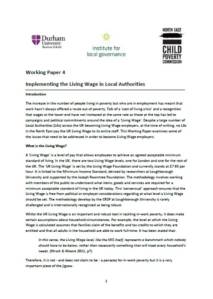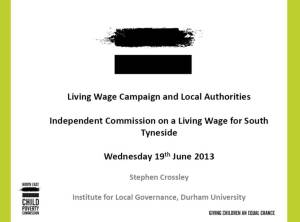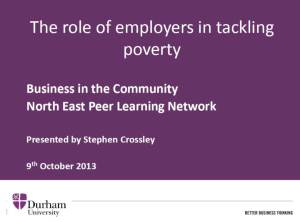
Two weeks ago, cleaners for government departments left letters on Minister’s desks asking to be paid the London Living Wage. The man who cleans Nick Clegg’s office was involved as was the lady who cleans George Osborne’s office. A Cabinet Office spokesman responded to the press coverage by stating that the government ‘are not convinced employers should be required to pay a higher living wage’
The release of the official HBAI stats recently showed yet another increase in working poverty (Chris Goulden from JRF called it ‘a relentless rise’ whilst the Director of the CSJ admitted they had ‘missed in-work poverty’) and this post will explore the idea that, contrary to being unable to afford to implement a Living Wage policy in the current climate, employers may consider that they can’t afford not to.
All in this together
The Coalition government has made great play of a private sector led recovery from the economic crisis but, for many people, businesses (especially large, multi-national ones) are still part of the problem. Recent concerns over private sector organisations such as G4S, A4E, Barclays (a Living Wage employer it should be noted) and Southern Cross suggest that ‘the market’ is often not best placed to deliver the kind of society many people would like. Polly Toynbee suggested that outsourcing of public services contracts ‘create moral hazard on a grand scale, where profits are private but losses are ours’.
Michael Bloomberg, Mayor of New York, owner of 11 homes and the 20th richest man in the world recently vetoed the Living Wage in New York whilst Lord Griffiths, the Vice Chairman of Goldman Sachs famously suggested that ‘we have to accept that inequality is a way of achieving greater opportunity and prosperity’. So employers potentially have a choice to make. Do they risk aligning themselves with ‘the orthodox market approach: that workers should be paid what the market deems they are worth’, and where ‘the interests of workers are relegated compared to the needs of capital’, or should the wage level ‘be based on what people need to live on and not what business can afford’? (Grover 2005, p13).
Many employers are already demonstrating that paying a Living Wage does not necessarily mean higher costs or reduced profits and can be entirely compatible with an effective business model. Guy Stallard from KPMG, says that paying a Living Wage ‘isn’t just about altruism … a really motivated workforce is in many ways even more important when businesses are facing really challenging times’ and ‘It is possible to behave ethically, and pay the Living Wage, while working to earn a profit.’ UNISON have also produced a summary of responses from Living Wage employers which highlight the ‘business case for the Living Wage’, something we are working on in the North East. Employers report higher retention rates, reduced absenteeism and a more motivated workforce.
A report by GLA Economic in 2009 on the ‘business benefits of implementing a Living Wage policy in London’ concluded that:
Our findings indicate that there is some evidence of significant financial and nonfinancial benefits achieved by those employers that have implemented the London Living Wage. Although some organisations indicated that there were non-trivial implementation costs, the absence of any evidence of substantial negative impacts on business performance on an on-going basis suggests that there is a likely positive net benefit of London Living Wage implementation for a typical firm. (my emphases)
Affordability
IPPR and the Resolution Foundation recently launched a report asking ‘What price a Living Wage?‘ exploring the impact of a living wage on firm level wage bills across 7 industrial sub-sectors. They calculated that the highest average wage bill increase would be in ‘bars & restaurants’ which would see an increase of around 6.2% whilst other sectors such as banking and construction would see an increase of around 0.1 – 0.2%. The report did not take account of any wage ‘spillover’ effects and nor did it analyse how employers might ‘bear the cost’ of implementing a Living Wage.
However, there is no reason why implementing a Living Wage should cost anything. As Hilary Metcalf pointed out at a meeting I attended recently, many other countries seem to do just fine by paying their lowest paid workers a little bit more and their highest paid workers a little bit less. The 28th British Social Attitudes Survey highlighted that a large majority of people (74%) thought that the gaps between those with high incomes and those with low incomes was too large and a smaller majority (55%) thought that ‘ordinary working people do not get their fair share of the nation’s wealth’. However, a minority (34%) felt that government should redistribute income from the better off to those who are less well off, which suggests that employer efforts at ‘pre-distribution’ would be well received by the public.
The London Borough of Islington have stated that they are able to implement the Living Wage without it increasing costs substantially and they have done this ‘by in-sourcing services and trimming the pay of the Chief Executive‘. Newcastle City Council have announced that they will be Living Wage employers and there are many other examples across the country. In Scotland, over 50% of local authorities have committed to paying the Living Wage, so it can be done by the public sector, even in times of austerity.
In the words of Thorstein Veblen “Ideally, and in the popular apprehension, the university is, as it has always been, a corporation for the cultivation and care of the community’s highest aspirations and ideals” and a number of universities, particularly in London, have committed to paying a Living Wage. Labour Students have highlighted the Living Wage as a major campaign for them nationally and a recent motion passed by DSU requires ‘the student’s union to campaign for the (Durham) University to pay all staff a Living Wage’.
Reputational benefits and risks……
The reputational benefits of being a Living Wage employer provide some of the strongest reasons why employers may choose to implement a Living Wage. Being seen as a ‘good’ employer will be important not only to potential employees but also to potential consumers in an era where ‘fairness’ is a concept that many people identify with. Sainsbury’s, generally seen as one of the more ethically minded supermarkets (it’s the world’s largest fairtrade retailer) have recently been targeted by the direct action Pay Up campaign as a result of them not paying their staff a Living Wage.
A note of caution…
Of course, the Living Wage is not a silver bullet for working poverty and I’ll post another blog looking at some of the assumptions and problems with it in the next couple of weeks. You can also pay staff a Living Wage and still be a pretty poor employer as well. However, as a symbolic gesture that you are serious about tackling in-work poverty amongst your workforce, I’d argue that it takes some beating. And it needn’t be ‘bad for business’ either.
Regards,
Steve

If you are an employer who is interested in becoming an accredited Living Wage employer, you can find out more about how to do this by contacting the Living Wage Foundation here








A flourishing and happy society?
I have been really impressed by the coverage that Living Wage Week has received and by some of the commitments and comments that have been made by some politicians. The Living Wage Foundation noted that at a No 10 lobby briefing on the 5th November, it was reported that a spokesman for the Prime Minister said ‘We back the idea of a Living Wage and we encourage businesses to take it up’ and Boris Johnson and the Miliband brothers, amongst others, have also spoken powerfully during the last seven days.
However, not everyone thinks it’s such a great idea. A piece in the Daily Mail called it ‘economic illiteracy’ and a very strange piece on the Spectator website claimed that a living wage was the ‘latest fad in this area of simplistic marketing slogans’ and ‘misses the point of poverty’. I wasn’t aware that poverty had a point, but I suppose, from a certain perspective, there are benefits to some people from others living in poverty.
Both articles were interesting in relation to how they framed the potential role of governments. The Spectator article, written by Ruth Porter from the IEA, suggested that the government should look at ways to reduce the cost of living in different areas of the UK and the Mail article suggested that the Minimum Wage was legislation enough and that:
The idea that somehow the minimum wage in Britain falls short and needs to be replaced with something better is a piece of nonsensical sophistry.
Aside from the totally false premise of its name, which suggests the existing minimum wage does not provide a living income, (the Living Wage) is a direct assault on the concept of free wage bargaining in a competitive economy.
Interestingly, the Adam Smith Institute proposed raising the tax free allowance to provide a Living Wage for all, shifting the responsibility for increasing the take home pay of employees from the employer to the state, noting that the lowest paid often pay proportionately more tax than those wealthier than them.
There are, of course, lots of very good business and economic reasons why employers should pay a Living Wage, not least the reputational benefits they might enjoy but surely we shouldn’t aspire to be a society that knows the price of everything and the value of nothing, one that is guilty of ‘tearing up the flowers to get at the worms’ in the words of Robert Tressell. Adam Smith himself, considered by some as the founder of free market economics, put it very well in The Wealth of Nations, when he wrote:
“Servants, labourers and workmen of different kinds, make up the far greater part of every great political society. But what improves the circumstances of the greater part can never be regarded as an inconvenience to the whole. No society can surely be flourishing and happy, of which the far greater part of the members are poor and miserable. It is but equity, besides, that they who feed, clothe and lodge the whole body of the people, should have such a share of the produce of their own labour as to be themselves tolerably well fed, cloathed and lodged.”
The Wealth of Nations was published in 1776. Thirty years later, Robert Owen said that:
“What ideas individuals may attach to the term “Millennium” I know not; but I know that society may be formed so as to exist without crime, without poverty, with health greatly improved, with little, if any misery, and with intelligence and happiness increased a hundredfold; and no obstacle whatsoever intervenes at this moment except ignorance to prevent such a state of society from becoming universal.”
Now, nearly 200 years on from this comment, it could be argued that there hasn’t been much progress in some of the areas highlighted by Owen, at least for some people. When there are five million workers paid less than a Living Wage, millions more unemployed and yet more castigated as scroungers for being unable to work or unwilling to do because they prioritise caring for others, large inequalities in health and eduational attainment and poverty looking likely to increase, can we call ourselves a happy and flourishing society?
regards,
Steve
Share this:
Leave a comment | tags: living wage, living wage week, low pay | posted in child poverty, comment, in-work poverty, poverty, services